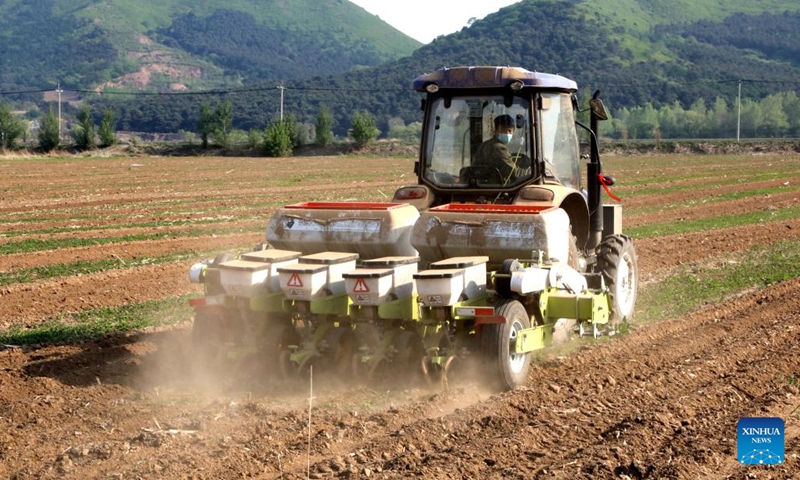
A farmer operates a machine to sow soybean seeds in a field in Fanhe Township of Tieling, northeast China's Liaoning Province, May 11, 2022. Liaoning has stepped up efforts on farming activities as the temperature rises recently. By May 17, the province's spring sowing area of crops has reached 48,645,000 mu (3,243,000 hectares).(Photo: Xinhua)
The Ministry of Agriculture and Rural Affairs on Wednesday issued two variety certification standards at the national level for genetically modified (GM) crops, including soybeans and corn, in what industry observers said a significant step in China's legalization of GM crops as the country seeks to further bolster its food security.
The move reduces the approval period for such varieties, which will pave the way for further commercialization in one of the world's top crop-producing countries.
China has taken a relatively strict attitude on GM crops due to safety concerns and uncertainty over how they may affect people who eat them over long periods.
Standards for GM soybeans and corn include requirements on resistance to herbicides and insects, as well as increases in productivity, according to a notice on the ministry's website.
The board of the national crop variety approval committee was told to immediately implement the standards, according to the notice.
"This is a critical step that paves the way for the commercialization of GM crops. In terms of upstream R&D, biotech scientists will be given standards to draw on to facilitate the GM breeding process. Crops that pass the standard test and obtain the necessary certifications will be qualified for massive planting in the future," Li Guoxiang, a research fellow at the Chinese Academy of Social Sciences, told the Global Times on Wednesday.
Li said that the two standards carry significant weight in ensuring China's grain security, at a time when the Russia-Ukraine conflict and other global factors pose a serious risk to global food security, and China's imports of agricultural products from the US, such as soybeans, are subject to great uncertainty amid geopolitical tensions.
For certain agricultural products such as corn and soybeans, China is heavily reliant on imports. The self-sufficiency rate of soybeans stood at 14.52 percent in 2021, with most imports from Brazil and the US. In terms of corn, imports from Ukraine accounted for 29 percent of the total.
"The first varieties to be approved are expected to be high-protein soybeans, which are used as raw material for soybean oil or feed," Wang Gangyi, a professor at Northeast Agricultural University, told the Global Times on Wednesday.
Wang also said that the food consumption structure of China is changing, with fewer carbohydrates but more protein (eggs, meat and milk), meaning that demand for the main feed ingredients (soybeans and corn) is also rising.
The two national standards can greatly shorten the time for GM varieties' certification, laying a foundation for further commercialization, Wang said.
Given the strict attitude toward GM crops, it usually takes at least two years for GM varieties to be certified in China, raising costs for firms.
Industry insiders said that after being approved, farmers also need to gain production permits.
"GM commercialization is moving forward in an orderly manner, and Chinese policymakers have laid out a clear plan on further deployment," Li Xinhai, director-general of the biotechnology research institute of the Chinese Academy of Agricultural Sciences, told the Global Times on Wednesday.
China granted approval for its first domestically developed GM crop strains in 10 years - two of corn and one of soybeans - at the end of 2019, news portal caixin.com reported. Since then, 16 corn strains and three soybean varieties have been granted biosafety approval, the report said.




